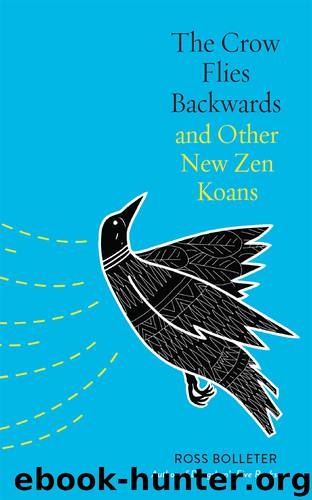The Crow Flies Backwards and Other New Zen Koans by Ross Bolleter

Author:Ross Bolleter
Language: eng
Format: epub
Publisher: Wisdom Publications
How Can Dust Settle on a Ruined Piano?
In Isshu Miura and Ruth Fuller Sasaki’s Zen Dust we learn that “dust” is an old Chan metaphor for phenomena: the stuff of the world as we experience it through our senses. The six dusts are sight, sound, smell, taste, touch, and thought, and their domain is the phenomenal world. The Chinese interpreted the term “dust” to mean “that which defiles the pure mind,” where “pure mind” evokes the sense of boundless empty mind.
Olivier’s reference to the mirror and to the dust draws on an old Zen story I will briefly recount. To do this I will draw in turn on Robert Aitken’s splendid telling of this story in his Gateless Barrier.
Huineng (638–713), who became the Sixth Ancestor, was a poor, uneducated layperson living at Xinzhou in the south of China. He gathered firewood and sold it to support his widowed mother. He had an awakening on hearing a monk chanting a line from the Diamond Sutra: “Dwell nowhere and bring forth that mind.” Huineng approached the monk and asked him who his teacher might be. The monk replied that his teacher, the Fifth Ancestor Daman Hongren (601–674) lived a thousand or more miles away in the north of China. Huineng made the long journey to meet Hongren at Huangmei Monastery. After their dialogue, which convinced the old teacher of the young layman’s ability, Hongren assigned Huineng to work in the rice-threshing shed.
At this time Hongren wanted to appoint a successor and set up a competition, saying: “Whoever believes he is worthy of transmission should submit a poem showing his insight into the essential matter, and I will acknowledge the author of the most cogent poem as the next master in our line.” Yuquan Shenxiu (606?–706) was regarded by the community as the most realized of the monks, so the challenge of writing the poem fell to him. However, he wasn’t sure of his own attainment, and after going thirteen times to Hongren’s room to present his poem, he finally wrote it anonymously on a wall. His poem read:
The body is the bodhi tree;
the mind is like a clear mirror;
moment by moment, wipe the mirrorcarefully;
let there be no dust upon it.
Download
This site does not store any files on its server. We only index and link to content provided by other sites. Please contact the content providers to delete copyright contents if any and email us, we'll remove relevant links or contents immediately.
The Way of Zen by Alan W. Watts(6600)
Ego Is the Enemy by Ryan Holiday(5413)
The Art of Happiness by The Dalai Lama(4125)
The Book of Joy by Dalai Lama(3972)
Why Buddhism is True by Robert Wright(3446)
Spark Joy by Marie Kondo(3298)
Shift into Freedom by Loch Kelly(3192)
Happiness by Matthieu Ricard(3040)
A Monk's Guide to a Clean House and Mind by Shoukei Matsumoto(2902)
The Lost Art of Good Conversation by Sakyong Mipham(2647)
The Meaning of the Library by unknow(2564)
The Unfettered Mind: Writings from a Zen Master to a Master Swordsman by Takuan Soho(2304)
The Third Eye by T. Lobsang Rampa(2257)
Anthology by T J(2206)
Red Shambhala by Andrei Znamenski(2193)
The Diamond Cutter by Geshe Michael Roach(2058)
Thoughts Without A Thinker: Psychotherapy from a Buddhist Perspective by Epstein Mark(2011)
Twilight of Idols and Anti-Christ by Friedrich Nietzsche(1890)
Advice Not Given by Mark Epstein(1878)
